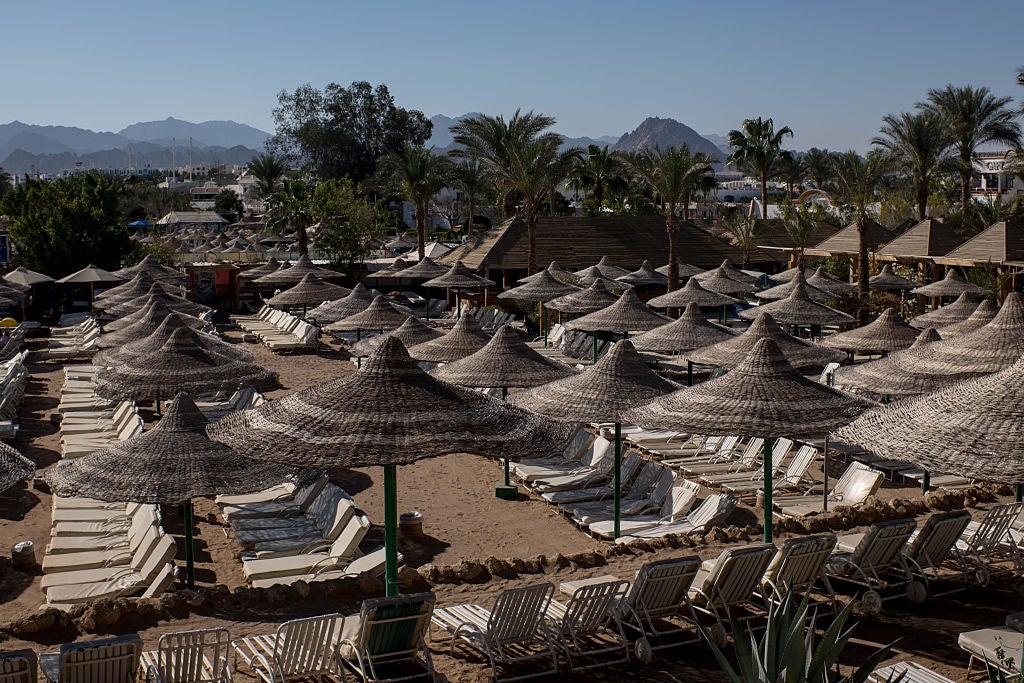How Sharm el-Sheikh struggled to recover after the Russian plane bombing
Almost a year since the Egyptian resort town was devastated by the downing of a Russian passenger plane by a bomb, it has lost much of the tourism that sustained it

Last year during the Muslim holiday of Eid al-Adha, the stunning Red Sea resort town of Sharm el-Sheikh was crowded with tourists from all around the world. During the same festival season last week, the beaches were half-filled, and hotel occupancy rates were low. At night, on the seaside promenade, restaurants and bars were largely empty. Some were closed.
The ghost of Metrojet Flight 9268 still haunts Sharm el-Sheikh. “It’s bad,” said Mohammed Adam, who scours the beaches looking for customers to sign up for snorkelling trips and other activities. “Last Eid, this place was packed. But since the bombing, there have been a lot less people.”
It’s been nearly a year since the Russian passenger plane was brought down by a bomb, killing all 224 people aboard, shortly after it left Sharm el-Sheikh International Airport. The attack, claimed by the Islamic State’s affiliate in Egypt’s Sinai Peninsula, raised questions about Egypt’s security at its airports. It prompted Moscow to halt all civilian flights to Egypt, while Britain and other nations stopped their airlines from operating routes to Sharm el-Sheikh, which accounts for a third of Egypt’s annual tourism revenue.
Since then, the Egyptian government has tried to regain the world’s confidence. It hired consultants to audit security at its airports, and has campaigned hard in Russia, Ukraine and other countries to woo back the hundreds of thousands of tourists who once flowed to Egypt’s resorts.
But with few signs of that strategy working, a sense of collective anger and frustration has built up among the tens of thousands of Egyptians whose livelihoods depend on tourism. They blame Western embassies for travel bans and the international media for damaging stories about terrorism in Egypt, insisting that their town is safe.
Some blame President Abdel Fatah al-Sisi’s government for its deteriorating relationships with some European nations – the source of many tourists – over human rights and other concerns, adding grist to the mounting criticism of Sisi’s handling of the country’s troubled economy.
“Before the Russian airplane fell down, everything was perfect,” said Mohammed Gamal, 32, the owner of two tourist shops on the promenade. “The town was full, the hotels were full. Bars, discos, restaurants and coffee shops – they were all full. Now, we have a lot of problems because we don’t have Western tourists.”
Those problems are visible in Gamal’s shops. Last Eid, he was selling about £300 a day worth of locally made perfumes, spices and papyrus paper emblazoned with portraits of pyramids and the sphinx. This year, he was lucky if he made £15 a day. He has laid off all five of his employees.
Many of the hotels and restaurants also have reduced staffing, an impact reaching far beyond the town. Workers here, from hotel receptionists to taxi drivers, hail from all over Egypt, often sending money back to their families. Tourism is an important source of foreign currency.
To be sure, thousands of Egyptians and Arabs from around the region still come to Sharm el-Sheikh, though in lower numbers than last year. But for tourism operators, Westerners are the real prize because they spend more money at hotels, restaurants and shops, and hand out bigger tips.
“We wish to see more Russians, English and other Europeans,” said Mina Nasiif, an employee at Trips House, which sells boat and desert excursions. His boss, Ahmed Ibrahim, said that “terrorism is everywhere, in England, France, everywhere”, but tourists are still going to London and Paris, adding that his business had shrunk by 70 per cent since the plane bombing. “It is because of politics,” he said.
One glaring example is Italy. This year, bookings by Italians planning vacations in Egypt have dropped 90 per cent compared with the summer of 2015, according to a report released by the market research firm Reportlinker, citing Mohamed Abdel Gabbar, head of foreign tourism at the Egyptian Tourism Authority. The report offered three reasons: the plane bombing; the torture and murder of an Italian student, Giulio Regeni, in Cairo this year, which human rights activists say bore the hallmarks of Egyptian security services; and an incident in which Egyptian security forces mistakenly killed Mexican tourists in September 2015.
What’s most frustrating, according to people who work in the town’s tourism sector, is that security is stronger than it has ever been in Sharm el-Sheikh. There are more than a dozen checkpoints along roads leading into the city where police look at identification cards. In the town, local and tourism police patrol the streets.
History, though, inspires confidence. Sharm el-Sheikh recovered from previous shocks to its economy, including several deadly militant attacks along the Red Sea coast between 2004 and 2006.
There are small signs of a turnaround emerging. Egypt’s tourism promotion authority is sponsoring a concert by well-known Ukrainian artists to attract Ukrainian tourists, according to local media reports. Turkish Airlines recently resumed flights to Sharm el-Sheikh, and some smaller European carriers are planning to follow suit this year.
“I hope the Russians, the British and other Westerners return by the end of the year,” Gamal said. “Or else you’ll see a lot more places close down.”
© Washington Post
Subscribe to Independent Premium to bookmark this article
Want to bookmark your favourite articles and stories to read or reference later? Start your Independent Premium subscription today.

Join our commenting forum
Join thought-provoking conversations, follow other Independent readers and see their replies